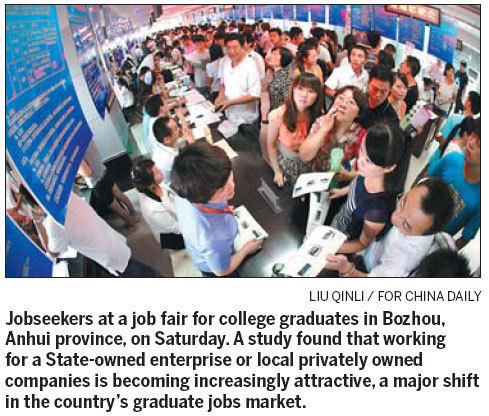

With four offers in hand, including from a major accounting firm and an investment organization, 22-year-old Li Xun didn't hesitate choosing to work for one of China's big four State-owned banks in Beijing.
"My parents and friends all convinced me that an opportunity like this is the best I can get," said Li, a native of Jiangsu province.
He chose a State-owned enterprise over a foreign company because it brings with it the chance of gaining a Beijing hukou (permanent residency permit), as well as comfortable working hours and a great opportunity to experience a truly Chinese working environment, he said.
"I don't think salary is the main concern for graduates like me," he said.
"What matters most is the chance to learn how to work in a typical Chinese company, something you don't get if you work with a foreign company."
Li's thinking is typical of many young jobseekers today, who say that multinationals with operations in China are no longer the most desired targets they used to be in the search for work.
Working for a State-owned enterprise or local privately owned companies is becoming increasingly attractive - a major change in the country's graduate jobs market, said Li Hongbin, a professor at School of Economics and Management at Tsinghua University.
His own research - conducted between 2010 and 2011 - shows that about half of those surveyed chose SOEs as their ideal workplace.
Despite foreign-funded organizations offering better pay - with an average monthly salary of 2,741 yuan ($333), followed by 2,238 yuan for SOEs, and 2,112 yuan for government institutions - the survey said the rapid rise in the appeal of SOEs and government institutions among graduates was down to better welfare packages and job security.
Last week, hundreds of employees facing redundancy by electronics firm Motorola Mobility protested in Nanjing, the capital of Jiangsu province, and in Beijing.
The protesters claimed the company plans to let go about 1,400 employees.
The large scale layoffs, say experts, could further underline the perception of lack of job security with multinational companies, and push more talent in the direction of SOEs and local private enterprises.
A 2011 survey of graduates by data and consulting organization, Mycos, showed 46 percent chose to work for private enterprises, 25 percent for SOEs, and just 16 percent for joint ventures and foreign-funded companies.
The rest chose a government institution or non-governmental organizations.
Like Li Xun, Ni Yuechao, 24, a computer science graduate from the University of Science and Technology in Beijing, said she would prefer working for a State-owned enterprise not only because of the Beijing hukou, but also because she considers the work will be relatively easy.
During her studies, Ni used to work as an intern at a private company, and she said she was shocked by the heavy workload.
"I don't want to work extra hours but it seems quite common in foreign enterprises.
"So I won't go to a foreign company unless the salary is really high," she added.
Guo Jiao, executive president of Mycos, said it is a common fear among graduates today that "glass ceilings" still exist at foreign companies, blocking the path to senior positions for female graduates.
And for all graduates, the perception is of better promotion prospects, in general, at SOEs, and other Chinese organizations.
Liang Chuchu, an MBA student at Tsinghua University, said that as long as the system of promotion is transparent, she doesn't care whether a company is State-owned or foreign.
Echo Wu, 24, who works with accounting firm PricewaterhouseCoopers in Shanghai, earning 78,000 yuan a year, said she wants her employer to offer room for creativity and personal development, and likes the thought of working for one of the world's top companies.
"The accounting systems we use originate from abroad, so does the idea of accounting firms. That's why I chose to join PwC. I want to stand on the shoulder of giants," said Wu, who majored in accounting.
Guo Jiao said that as local enterprises become stronger, multinationals will find it more challenging to compete for talent.
Shane Tedjarati, president and chief executive officer of Global High Growth Regions at systems giant Honeywell International Inc, said attracting the best talent is a company's biggest investment, and keeping that talent should be its top priority.
"I have to create an environment where Chinese people feel respected and where they feel they can make a difference.
"There must be no glass ceilings, and employees must feel they can climb the career ladder quickly, to grow and learn. Those are the biggest challenges."
Ye Yiwen contributed to this story.
wangzhuoqiong@chinadaily.com.cn
(China Daily 08/22/2012 page13)







